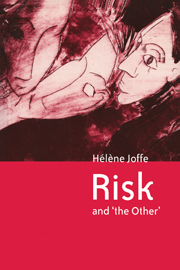Book contents
- Frontmatter
- Contents
- Preface
- Acknowledgements
- 1 Responses to risks: an introduction
- 2 Human responses to risks: ‘not me’, ‘the other is to blame’
- 3 A study of lay people's responses to a risk: HIV/AIDS in Britain and South Africa
- 4 Evaluating two social psychological models of the response to risks
- 5 The source of linking risk and ‘the other’: splitting objects into ‘good’ and ‘bad’
- 6 Social representations of risks
- 7 Emotional life: a new frontier for social theory
- 8 Changing social representations of risks
- References
- Index
2 - Human responses to risks: ‘not me’, ‘the other is to blame’
Published online by Cambridge University Press: 22 September 2009
- Frontmatter
- Contents
- Preface
- Acknowledgements
- 1 Responses to risks: an introduction
- 2 Human responses to risks: ‘not me’, ‘the other is to blame’
- 3 A study of lay people's responses to a risk: HIV/AIDS in Britain and South Africa
- 4 Evaluating two social psychological models of the response to risks
- 5 The source of linking risk and ‘the other’: splitting objects into ‘good’ and ‘bad’
- 6 Social representations of risks
- 7 Emotional life: a new frontier for social theory
- 8 Changing social representations of risks
- References
- Index
Summary
How are outsiders represented in societies? This question must be addressed prior to exploration of the representations of ‘the other’ which arise at times of imminent danger. Regard for ‘the other’ is intricately connected with the ‘not me’, ‘not my group’ response. In this chapter I demonstrate that people establish a positive sense of identity by way of the juxtaposition between what can comfortably be associated with ‘others’ and elements with which ‘self’ seeks to affiliate.
The ‘not me – other’ response
Regard for ‘the other’ in an ongoing sense
Before exploring the association between ‘otherness’ and moments of potential disaster, it is important to decipher how ‘the other’ is regarded in an ongoing sense in society. The concept ‘the other’ is very widely used in cultural theory. The word ‘other’ generally includes those outside of, and implicitly subordinate to, the dominant group. According to Said (1978), a distinctive aspect of being ‘other’ is that one is the object of someone else's fantasies, but not a subject with agency and voice. This can be illustrated by his claims concerning ‘the Orient’. The Orient was an entity constructed by European culture. During the post-Enlightenment period a set of political, sociological, military, ideological and scientific discourses established ‘the Orient’. Members of ‘the Orient’ did not speak of themselves. They did not represent their own emotions or history. Rather, the Orient was filtered through the lens of European culture. This lens diminished the status of ‘Orientals’.
- Type
- Chapter
- Information
- Risk and 'The Other' , pp. 18 - 36Publisher: Cambridge University PressPrint publication year: 1999
- 1
- Cited by



